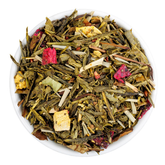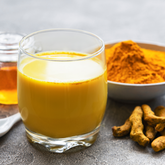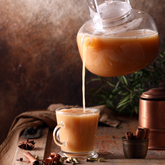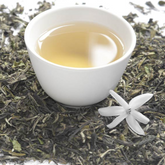Hibiscus tea, also sometimes known as roselle or red tea, is a tart, cranberry-like herbal tea. Some of the benefits of hibiscus tea include high levels of iron and vitamin C, antibacterial properties, and more. This tea is enjoyed in regions all around the world, including in West Africa, Mexico, Central America, the Caribbean, India, Persia, Cambodia, and more. Hibiscus tea can be consumed on its own, or as an ingredient in other tea blends. It can be served hot or over ice (we think iced hibiscus mixed with lemonade makes a particularly tasty summer treat!)
Benefits of hibiscus tea
Whether you’re drinking hibiscus for its many healthful qualities, or just enjoy the taste of this unique tisane, here are some of our favorite health benefits of hibiscus tea.
1. High in antioxidants
Hibiscus is extremely high in antioxidants, including beneficial polyphenols. Antioxidants have been shown to help reduce the presence of harmful free radicals in the body and promote overall cellular health. Antioxidants can also help to ward off certain degenerative diseases, including cancer. Experts recommend including ingredients like hibiscus that are high in antioxidants as part of a healthy, balanced diet.
2. Good source of iron
Hibiscus is a great source of iron, which can help improve energy and focus, boost the immune system, regulate body temperature, and much more. Low iron levels can result in anemia, and other health issues. People who menstruate or are over 65 may be at increased risk for low levels of iron. Vitamin C has been shown to help iron absorption, making hibiscus tea an especially effective way to increase your iron intake!
3. High in vitamin C
Hibiscus tea is also extremely high in Vitamin C. Vitamin C plays an important role in the body, helping to facilitate growth, repair tissue, heal wounds, and much more. Hibiscus is a tasty, healthful way to get enough Vitamin C in your diet.
4. May help lower blood pressure
Studies have shown that hibiscus tea can help to lower blood pressure. Research suggests that daily consumption of hibiscus tea can help to treat high blood pressure in adults with mild hypertension, making it a healthy addition to the diet for people suffering from high blood pressure.
5. May help prevent cancer
Consuming hibiscus tea may also help to prevent certain types of cancer. Studies have shown that hibiscus tea can act as a therapeutic agent against squamous cell carcinoma, prostate cancer and gastric cancer. Because of its high antioxidant content, hibiscus tea can also help to ward off cancer more broadly.
6. Contains antimicrobial and antibacterial properties
Hibiscus tea contains antimicrobial and antibacterial properties that can help to promote overall health. Consuming hibiscus tea can help to inhibit the growth of bacteria and to fight off disease and illness. Hibiscus has been used for this purpose throughout the world as alternative medicine for hundreds of years, and recent studies support the use of hibiscus for antimicrobial and antibacterial purposes.
7. Can help boost metabolism
Hibiscus has also been shown to help boost metabolism and maintain a healthy weight. Studies have shown that consuming hibiscus can help to reduce body fat percentage and BMI. Hibiscus also improves overall metabolic health and can be a great addition to a balanced diet if you’re looking to better regulate your metabolism and maintain a healthy weight.
About hibiscus tea
Hibiscus tea is an herbal tea made from the dried petals of the hibiscus plant (hibiscus sabdariffa) and is also sometimes known as roselle. It has a pleasantly tart, sweet flavor reminiscent of cranberry, and brews up a vibrant magenta color. Hibiscus is also used to add color and flavor to many other varieties of herbal tea. This tea is enjoyed worldwide, and is often sweetened and spiced depending on regional culture and cuisine. While hibiscus tea can be served hot, it also makes a delicious iced tea!
How to prepare hibiscus tea
Hibiscus teas can be prepared in the same way as regular herbal teas and tisanes. We recommend using approximately one teaspoon of tea for every four ounces of water, and heating the water to a roiling boil before infusing the tea leaves for about six minutes. You can also prepare hibiscus using a cold brew method.
To cold brew hibiscus tea, use the same ratio of tea to water, and infuse the tea leaves with cold water overnight in the refrigerator. Remove the tea leaves in the morning, and enjoy a refreshing pitcher of iced tea ready to go! Most hibiscus tea blends make excellent iced teas, with the tart, mildly acidic flavor of hibiscus balanced out by other fruity and sweet elements. For a twist on a traditional iced tea, try blending iced hibiscus with lemonade for a sweet, tart summer treat.















